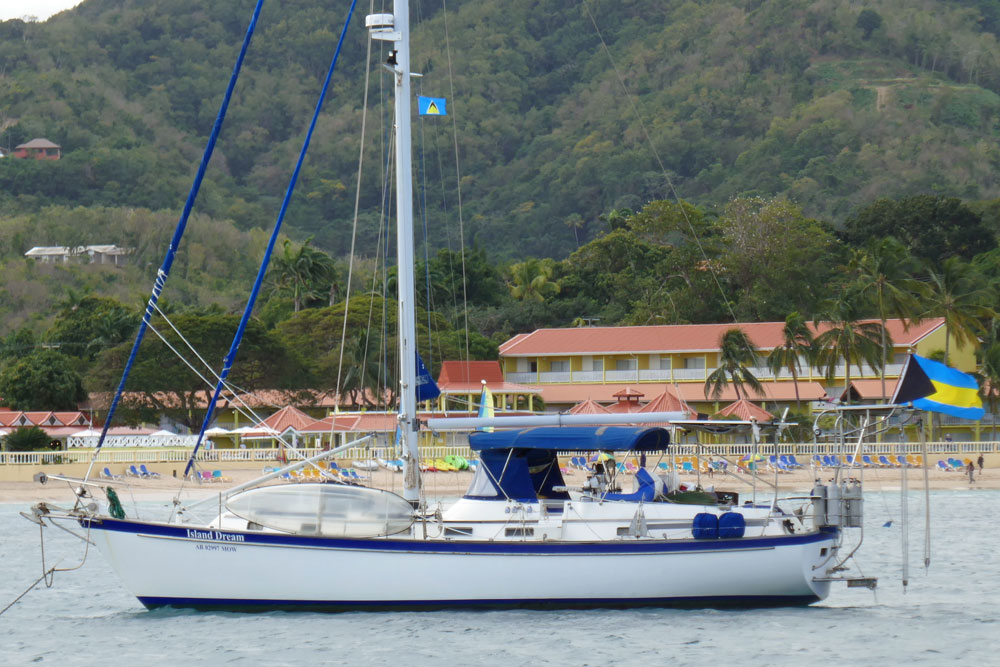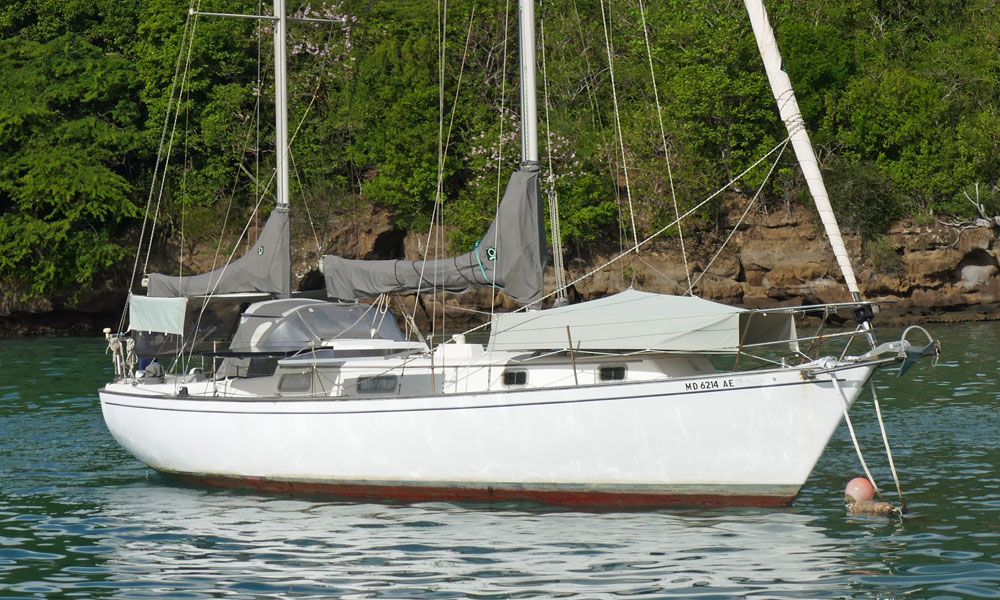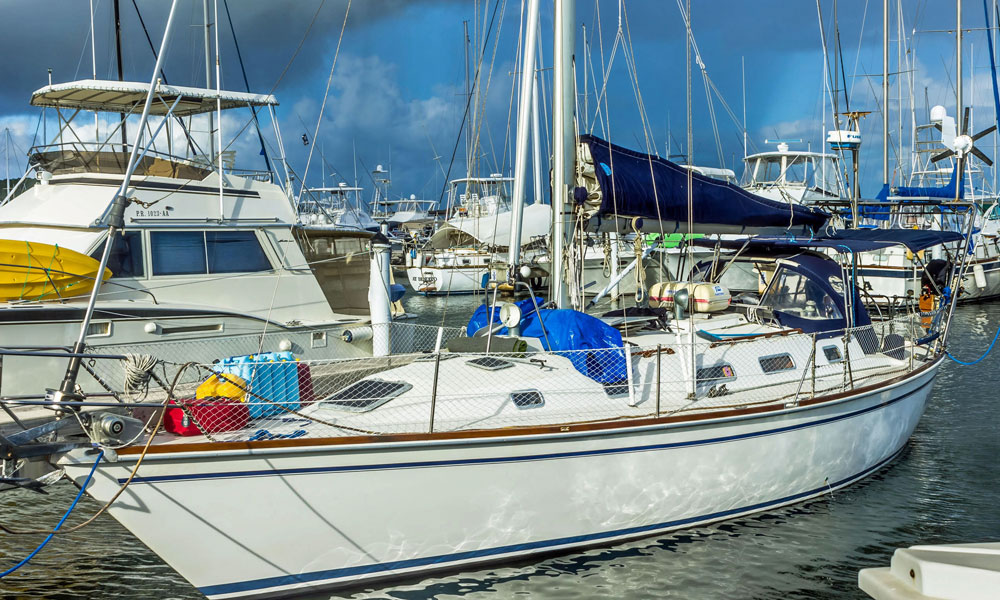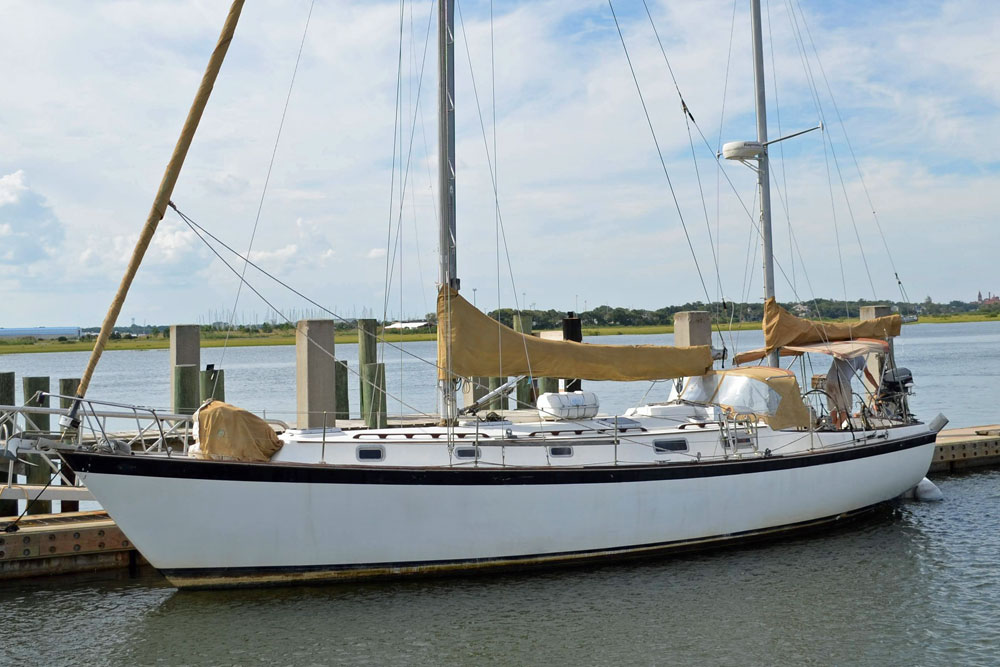- Home
- Cruising Yachts 35' to 40'
- Pearson 385
The Pearson 385 Sailboat
The Pearson 385, a centre-cockpit cutter, was designed by William Shaw and built in the USA by Pearson Yachts.
Published Specification for the Pearson 385
Underwater Profile: Fin keel & Spade Rudder
Hull Material: GRP (Fiberglass)
Length Overall: 38'3" (11.7m)
Waterline Length: 30'0" (9.1m)
Beam: 11'7" (3.5m)
Draft: 5'6" (1.7m)
Rig Type: Cutter
Displacement: 20,575lb (9,333kg)
Designer: William Shaw
Builder: Pearson Yachts (USA)
Year First Built: 1989
Published Design Ratios for the Pearson 385
1. Sail Area/Displacement Ratio: 13.1
2. Ballast/Displacement Ratio: 47.0
3. Displacement/Length Ratio: 340
4. Comfort Ratio: 37.5
5. Capsize Screening Formula: 1.7
Performance Predictions, Based on the Design Ratios
The Pearson 385 has a length overall of 38.25 feet, a waterline length of 30 feet, a beam of 11.5 feet, and a draft of 5.5 feet. It has a displacement of 20,600 pounds, and a ballast of 9,670 pounds, giving it a ballast-to-displacement ratio of 47%, which indicates a stiff and stable boat that can carry sail well in strong winds. The sail area is 615 square feet, and the sail area-to-displacement ratio is 13.1, which suggests a moderate sail plan that is not underpowered or overpowered. The displacement-to-length ratio is 340, which places the boat in the heavy category, meaning it has a comfortable motion in waves and chop, but may not be very fast or agile. The capsize screening formula is 1.7, which is below the threshold of 2.0, indicating that the boat has a good righting ability and is suitable for ocean passages.
Production Period and Numbers Produced
The Pearson 385 was produced from 1984 to 1986, and about 40 boats were built. It was one of the last models from Pearson Yachts before the company filed for bankruptcy in 1991. The Pearson 385 was based on the same hull design as the Pearson 386, which was an aft-cockpit version that was also available as a sloop or a cutter. The Pearson 385 was marketed as a "space ship" due to its large interior volume and spacious accommodations.
Alternative Versions & Options
The Pearson 385 was offered with two keel options: a fin keel with a draft of 5.5 feet, or a centerboard with a draft of 4.33 feet when up and 6 feet when down. The centerboard version allowed for more shallow-water cruising, but added some complexity and maintenance to the boat.
The standard rig was a cutter, with a self-tacking staysail on a boom that could be reefed or furled independently from the mainsail and the genoa. Some owners have converted their boats to sloops by removing the inner forestay and the staysail boom, which simplifies the rigging and reduces windage, but also reduces sail area and versatility.
The boat came with an in-mast roller-furling mainsail system, which made reefing easy but also reduced sail shape and performance. Some owners have replaced this system with a conventional slab-reefing mainsail with battens and lazy jacks, which improves sail efficiency and control.
Number & Location of Sleeping Berths
The Pearson 385 has three cabins and two heads, providing sleeping accommodations for up to seven people. The forward cabin has a V-berth that can sleep two people, with storage lockers and shelves on both sides, and an overhead hatch for ventilation. The forward cabin also has its own head with a sink and a manual toilet. The main saloon has two settees that can be used as single berths, with storage cabinets above them and behind them. The saloon also has a drop-leaf table that can seat six people comfortably, and another overhead hatch for ventilation.
The galley is located on the port side of the saloon, and has a three-burner propane stove with an oven, a refrigerator/freezer, a microwave oven, a double sink with hot and cold water, and plenty of counter space and storage drawers.
The navigation station is located on the starboard side of the saloon, opposite the galley, and has a large chart table with storage underneath, an electrical panel, and space for instruments and radios. The aft cabin is accessed from the starboard side of the cockpit, through a companionway that leads to a passageway with another head on the port side. The head has a sink, a manual toilet, and a separate shower stall with hot and cold water.
The aft cabin has a double berth that is arranged across the boat, with storage lockers on both sides, an opening portlight on each side for ventilation, and an escape hatch above the berth.
History of the Boatbuilder
Pearson Yachts was founded by cousins Clinton and Everett Pearson in 1956, and was one of the first fiberglass sailboat manufacturers in the world. The company started by building fiberglass dinghies in their garage, and then expanded to larger boats with the help of naval architect Carl Alberg, who designed the Triton 28, which was a huge success at the 1959 New York Boat Show.
Pearson Yachts went public in 1959, and acquired the old Herreshoff Yard in Bristol, Rhode Island, as an additional production site. The company introduced many new models, most of them designed by Alberg, and grew rapidly during the 1960s and 1970s. However, the company also faced financial difficulties, and was taken over by Grumman Allied Industries in 1961. The Pearson cousins left the company in the 1960s, and Bill Shaw became the chief designer. Shaw designed many popular models, such as the Pearson 26, the Pearson 30, the Pearson 35, and the Pearson 40.
Pearson Yachts continued to produce quality boats until the late 1980s, when the market for sailboats declined and the company faced increased competition from other builders.
Pearson Yachts filed for bankruptcy in 1991, and was eventually sold to TPI Composites, which acquired the rights to the Pearson name and some of the moulds.
Secondhand Values
The Pearson 385 is a relatively rare boat on the secondhand market, as only about 40 boats were built. The asking prices for these boats vary depending on their condition, equipment, and location, but they generally range from $50,000 to $80,000. The average sold price for a Pearson 385 is around $65,000.
The above text was drafted by sailboat-cruising.com using GPT-4 (OpenAI’s large-scale language-generation model) as a research assistant to develop source material; we believe it to be accurate to the best of our knowledge.
Other sailboats in the Pearson range include:
Recent Articles
-
Beneteau Oceanis 473 Review: Specs, Performance & Cruising Guide
Feb 20, 26 04:49 AM
An in-depth review of the Beneteau Oceanis 473. Discover technical specifications, design ratios, and why this Groupe Finot design remains a top offshore cruising choice. -
Luders 36 Review: Specs, Performance Ratios & Cruising Guide
Feb 17, 26 06:20 PM
An in-depth expert review of the Luders 36 sailboat. Explore technical specifications, design ratios, and the offshore cruising capabilities of this classic Bill Luders design. -
Deck-stepped vs. Keel-stepped mast: An Offshore Engineering Guide
Feb 16, 26 07:59 AM
Comparing deck-stepped vs. keel-stepped mast systems. We analyze the propped cantilever effect, structural loads, and maintenance for offshore sailors.



